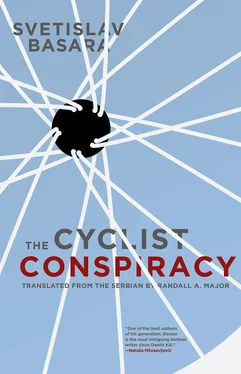It is difficult to briefly give an acceptable answer to the question of why we have chosen, between two equally unproven hypotheses, the one that has worse consequences for us: Why have we chosen death? One of the countless answers would be the following: we have chosen death because we have become civilized, but not civilized in the sense which that word aspires to — in that sense we have regressed with time — but in the sense that we have become inhabitants of the city. Civitas terrena is a symbol of man’s affinity for an independent life, for life without God and without eschatological responsibility. History begins as a violation, as the usurping of freedom, of goods, of authority over others; in order for human memory to be possible at all, God had to be forgotten. The city is the ideal place for that kind of forgetting. For example, the Indo-European root grˇd , from which the Slavic words “ grad ,” “ hrad ,” “gorod” (“city”) are derived, actually means “to make ugly,” “to disfigure.” Plotinus called this world a “beautified corpse,” and was completely right. The city introduces disorder in the hierarchy of the universe, in the first place by blocking the horizon with its walls, and then blocking the heavens with the fictitious grandiosity of its towers. But what does big mean? Seen from Mars, our planet seems to be this size — ; observed from the outreaches of the solar system, it looks this big — ·; observed from the center of the galaxy it cannot be seen at all and seen sub speciae aeternitatis it does not exist. Large, small — those are all prejudices of a subject that has become a solipsism. Because erecting a city is preceded by shutting oneself up in the limitations of one’s own being, the unnatural desire for self-sufficiency, Satan’s sin — solipsism. The serpent’s promise — eritis sicut Dei — was seemingly kept; a statue of Baal or Stalin, it makes no difference, can always be placed in the city square; it is impossible to be without some kind of “god,” but Baal and Satan are cruel “gods”; to serve them means to distrust and hate. In spite of that, it would be worthwhile in a way to rehabilitate Stalin. Appointed by the synod of the Grand Masters to the task of stopping the construction of the Earthly City, he betrayed them and became convinced that such a city could be built. And yet, to tell the truth, he was not the one who caused the terror of the denunciations, the rigged trial proceedings or the GULAG. No, the need of the masses to denounce, to destroy and kill, put Stalin at the top of the hierarchy — we counted on that — but the masses thereby took on a legitimacy that even Joseph Vissarionovich began to believe in, and we did not count on that.
One does not believe in Baal or Stalin out of conviction, it was always known that the Golden Calves were bronze contrivances, but out of interest — everyday, small, trivial interests. The worst of all disgraces is the worship of dead idols for the sake of a crust of bread, a glass of wine, a soiled bed. But idols have a powerful weapon at hand — flattery. And, as the Romans said, vulgus vult decipi . It is almost ridiculous, if it were not so tragic, this human affinity for self-deception. And so the world is becoming an ever more beautified corpse; however, it is no longer enough for the streets to be clean; from the façades of buildings, enormous billboards authoritatively claim that everyone is happy, that everything is in order, and that it will stay that way forever. Ultimately, practicality has proven itself to be childish idealism; whoever longs for reality is becoming unreal, whoever longs for the surreal is becoming real. That is the way the world order works.
Since that day in Eden when Adam and Eve were deceived by the slogan eritis sicut Dei , their progeny have tirelessly fallen for slogans of similar formulation. Each of them conceals the futile promise: you shall be like gods. One of the strongest urges in man, carefully disguised behind the masks of other urges, is the urge to be god, to be omnisciently omnipotent. Such an elevated aspiration certainly does not come from man; if it were from him, it would surely end up on the junk pile, there where all “elevated” human ideas end up. God intended, our old Grand Masters said, for man to become like a god. Where did the misunderstanding arise? The paradox is only illusory. Adam stopped along the way of the vertical ascent to God (and here we arrive at the very essence of the mystery of evil — to the boundary). By thinking: I am now like God, Adam fell away from God because he juxtaposed his subjectivity to God’s subjectivity; by becoming aware of himself, he separated himself from God and thus became — instead of an independent subject — an object controlled by external elements and death; an absurd, mortal-immortal being, simultaneously mindful and mindless.
Every city, as you know, echoes with an unbearable clamor. At first glance, a lot of different things are being talked about, but all of that can be reduced to one simple sentence: solus ipse sum . That is exactly how the mystics describe hell. For, Gehenna is not some other city , as blessed Augustine teaches — it is every city. Just as the Kingdom of God is within us, so hell is within us as well. That is the solipsism. The evil of the world is the projection of our internal evil, a projection which, reflected back from the apathy of the external, returns amplified a hundred times and destroys the subject.
Bicyclists, evil seems to be omnipotent, but things are not really that way. Evil is destined to failure, because it is limited. Evil is just the boundary that divides and destroys unity, but at the same time that boundary limits evil as well only in its effort to become endless. In other words, evil is not an entity in the way it was imagined by the Manicheans, it is rather good that has left the path toward its goal — to the highest good — and gotten lost in itself. And in this case, the goal justifies every means. If I do not have any other goal than myself and my own comfort — I am evil; I will try to take others’ good, I will not see a fellow brother in someone else but a competitor, or perhaps even an enemy. All the misery of this world rests on such metaphysically disloyal competition. But it cannot be said that we are sent into that war unprepared. First of all the family, then the schools and other bigoted institutions, teach quite openly that it is good to trod on others to get to the goal, and if those others resist, then you trod on dead bodies. And that is how the thieves, drunks, blasphemers and perverts have gotten their hands on the ruling places in the world.
It should be explained why the thesis about the finality of death is politically opportune. The equation is fairly simple and petty, as is appropriate for politics. If I allow them to convince me that I am a mortal being who is returning to nothingness, I am left without a future. Namely, death can cut me down at any given moment. With that conviction, I am desperate. I can laugh, have fun, experience joy — and I do — but in the depths of my being I have suppressed my desperation, and the means of smiling, having fun and raising fear serve only to distract me from my desperation. If I am mortal, if God does not exist, then, as Dostoyevsky says, I am allowed to do everything. Why shouldn’t I be? Anyway everything is disappearing into nothingness. Spineless men with some sort of fluid morals blather on in highfalutin speeches, but there are no morals. A mortal being cannot be moral; in the best case scenario, it might become esthetic. And logically, a creature who has no future turns to the past. That is how the homo istoricus comes about. His only basis is the past; he attempts to fill that past with pleasant memories. When someone says “my life,” rarely do they mean that they are alive here and now, rather they mean their biography — their life wasted in the times past. The ideologies of death are always focused on the past, always oriented to the idealization of things forever vanished. In such societies, the future is more of a respect for grammar than it is a hope. And that is logical as well: in a future filled with vague projections, only one thing is certain — death.
Читать дальше












